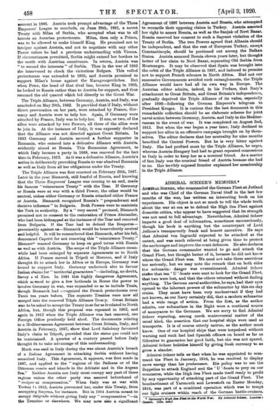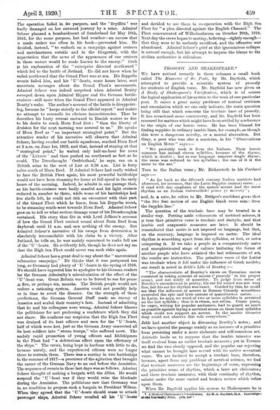ADMIRAL SCHEER'S MEMOIRS.*
Aratittse Sonzze, who commanded the German Fleet at Jutland and who was Chief of the German Naval Staff in the last few months of the war, has written an interesting book on his experiences. His object is not so much to tell the whole truth about the war at sea, as to defend the High Sea Fleet against domestic critics, who appear to have suggested that its strength was not used to full advantage. Nevertheless, Admiral Scheer imparts a good deal of information, sometimes unconsciously, though his book is anything but the counterpart of Lord Jellicoe's transparently frank and honest narrative. He says that Admiral von Ingenohl expected to be attacked at the outset, and was much relieved at being given time to protect the anchorages and improve the coast defences. He also declares that the German commander wanted to go and attack the Grand Fleet, but thought better of it, because he did not know where the Grand Fleet was. We need not take these assertions too seriously, but we may note the remark that on both sides the submarin.- danger was overestimated. Admiral Scheer states that ten U '-boats were sent to look for the Grand Fleet, that two were lost, and that the others returned without finding anything. The German naval authorities, he says, had their eyes opened to the inherent powers of the submarine by this six -day cruise. They must have been very unobservant if they had not known, as our Navy certainly did, that a modern submarine had a wide range of action. From the first, as the author admits, our submarines in the Bight were a continual source of annoyance to the Germans. We are sorry to find Admiral Scheer repeating, among much controversial matter of the usual kind, the assertion that our hospital ships were used as transports. It is of course utterly untrue, as the author must know. One of our hospital ships that were torpedoed without warning and sunk had had Spanish officers on board as far as Gibraltar to guarantee her good faith, but she was not spared. Admiral Scheer belittles himself by giving fresh currency to so gross a slander.
Admiral Scheer tells us that when he was appointed to com- mand the Fleet in January, 1916, he was resolved to display more energy than his predecessor. His policy was to use the Zeppelins to attack England and the ' U '-boats to prey on our commerce, while the High Sea Fleet made itself ready to profit by any opportunity of attacking part of the Grand Fleet. The bombardment of Yarmouth and Lowestoft on Easter Monday, 1916, was part of a combined operation which was to tempt our light onneers within reach of the German battle-cruisers.
• 04rinany's Rig* Soo likut in Me Worki War. /3y At:unwed Wain. London Cone& Inc soil The operation failed in its purpose, and the Seydlitz ' was badly damaged on her outward journey by a mine. Admiral Scheer planned a bombardment of Sunderland for May 18th, 1916, for the same purpose, but bad weather—an excuse that n made rather too often in his book—prevented him. He decided, instead, "to embark on a campaign against cruisers and merchantmen outside and in the Skagerrak, with the expectation that the news of the appearance of our cruisers in those waters would be made known to the enemy." Such is his explanation of the "enterprise directed northward" which led to the battle of Jutland. He did not know when he sailed northward that the Grand Fleet was at sea. His Zeppelin scouts failed him, and his ' '-boats, some hours later, sent uncertain messages about the Grand Fleet's movements. Admiral Scheer was indeed surprised when Admiral Beatty swooped down upon Admiral Hipper and the German battle- cruisers—still more when the Grand Fleet appeared in Admiral Beatty's wake. The author's account of the battle is disappoint- ing, because he "keeps strictly to the official report" and makes no attempt to reconcile its obvious inconsistencies. Thus he describes his hasty retreat eastward to Danish waters as due to his desire to reach Horn Reef first "then the liberty of decision for the next morning was assured to us." He speaks of Horn Reef as "an important strategical point." But the attentive reader of his narrative will observe that Admiral Scheer, having evaded our battle squadrons, reached Horn Reef at 3 a.m. on June let, 1916, and that, instead of staying at that "strategical point," he waited only half-an-hour for news of the Liitzow ' and -then pushed on southward as fast as he could. The Dreadnought Ostfriesland,' he says, ran on a British mine to the west of List at 5.30 a.m. List is forty miles south of Horn Reef. If Admiral Scheer had really wished to face the British Fleet again, his most powerful battleships would not have been steaming for home at full speed in the early hours of the morning. Indeed, he admits in one passage that, as his battle-cruisers were badly mauled and his light cruisers reduced in number to three, while some of his battleships had few shells left, he could not risk an encounter with that part of the Grand Fleet which he knew, from his Zeppelin scout, to be steaming south-west towards Horn Reef. Admiral Scheer goes on to tell us what serious damage some of his Dreadnoughts sustained. His story thus fits in with Lord Jellicoe's account of how the Grand Fleet cruised round about Horn Reef from daybreak until 11 a.m. and saw nothing of the enemy. But Admiral Sc,heer's narrative of his escape from destruction is t bsolutely irreconcilable with his claim to a victory. After Jutland, he tells us, he was mainly concerned to make full use • the 'U '-boats. He evidently felt, though he does not say so, that the High Sea Fleet could never run such risks again.
Admiral Scheer has a great deal to say about the "unrestricted submarine campaign." He thinks that it was postponed too long, as.Germany had plenty of 'U '-boats in the spring of 1916. We should have expected him to apologize to his German readers for the German Admiralty's miscalculation of the effect of the ' '-boat war. Great Britain was to be forced to sue for peace ai five, or perhaps six, months. The British people would not endure a rationing system. America eould not possibly help us in time to avert the disaster. On the strength of these predictions, the German General Staff made an enemy of America and sealed their country's fate. Instead of admitting that he and his colleagues were wrong, Admiral Scheer blames the politicians for not professing a confidence which they did not share. He confirms our suspicion that the High Sea Fleet was drained of its best officers and men for the 'U '-boats, half of which were lost, just as the German Army converted all its best soldiers into "storm troops," who suffered most. The unduly rapid promotion of young officers and Midshipmen in the Fleet had "a deleterious effect upon the efficiency of the ships." The crews, being kept in harbour with little to do, became unruly, and the experienced officers were no longer there to restrain them. There was a mutiny in two battleships in the summer of 1917—a precursor of the agitation that brought the career of the German Navy to an end before the Armistice. The sequence of events in those last days WM as follows. Admiral Scheer thought of making a bargain with the Allies. He would suspend the 'U '-boat war if they would raise the blockade daring the Armistice. The politicians saw that Germany was in no condition to propose such a bargain to President Wilson. When they agreed that the U '-boats should cease to attack passenger ships, Admiral Scheer recalled all his '-boats atthallaivasity Frets. Res. net and decided to use them in co-operation with the High Sea Fleet for "a plan directed against the English Channel." The Fleet concentrated off Wilhelmshaven on October 28th, 1918. Next day the crews began to mutiny, believing—rightly enough— that they were to be uselessly sacrificed, and the offensive was abandoned. Admiral Scheer's grief at this ignominious collapse is natural enough, but his attempt to impute the blame to the civilian authorities is ridiculous.



































 Previous page
Previous page